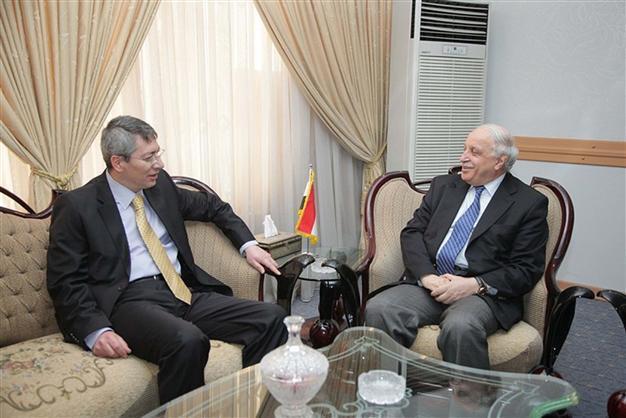Iraq summons Turkish envoy again as tensions grows
BAGHDAD - Reuters

Yunus Demirer (L). AA Photo
Iraq has summoned Ankara's ambassador in Baghdad to protest the behaviour of two Turkish diplomats, the latest episode in a drawn-out public row between the neighbours.An official from Iraq's foreign ministry met Turkey's ambassador, Yunus Demirer, to complain about the Turkish diplomats in the cities of Basra and Mosul, a statement on the foreign ministry website said today. "Some activities conducted by the two Turkish General Consuls in Basra and Mosul ... are far from their Consular duties and obligations stated in the Vienna Convention for Consular Relations of 1963," the statement said, without elaborating.
It said that the meeting took place on Tuesday but did not say what the diplomats were accused of.
Turkish Prime Minister Tayyip Erdogan and his Iraqi counterpart Nuri al-Maliki have traded tit-for-tat criticisms and accusations several times this year.
Erdogan last month accused Maliki of fanning tensions between Shi'ite Muslims, Sunni Muslims and Kurds in Iraq through "self-centred" behaviour..
Maliki quickly responded that Turkey was becoming a "hostile state" with a sectarian agenda, saying it was meddling in Iraqi affairs and trying to establish regional "hegemony".
Iraq summoned Turkey's ambassador at the time and Turkey responded by summoning Iraq's envoy in Ankara.
Analysts say mainly Sunni Turkey is worried that growing tensions in Iraq and violence in their mutual neighbour Syria may lead to a wider Sunni-Shi'ite conflict in the region.
Erdogan's government has recently forged close ties with Masoud Barzani, president of Iraq's semi-autonomous Kurdish region, which is embroiled in a row with the Baghdad government over claims to the city of Kirkuk and the region's oil.
Iraq is Turkey's second largest trading partner after Germany with trade reaching $12 billion last year, more than half of which was with the Kurdish region.
















